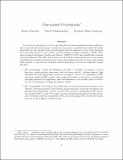Fine-Grained Cryptography
Author(s)
Degwekar, Akshay Dhananjai; Vaikuntanathan, Vinod; Vasudevan, Prashant
DownloadVaikuntanathan_Fine-grained.pdf (539.5Kb)
OPEN_ACCESS_POLICY
Open Access Policy
Creative Commons Attribution-Noncommercial-Share Alike
Terms of use
Metadata
Show full item recordAbstract
Fine-grained cryptographic primitives are ones that are secure against adversaries with an a-priori bounded polynomial amount of resources (time, space or parallel-time), where the honest algorithms use less resources than the adversaries they are designed to fool. Such primitives were previously studied in the context of time-bounded adversaries (Merkle, CACM 1978), space-bounded adversaries (Cachin and Maurer, CRYPTO 1997) and parallel-time-bounded adversaries (Håstad, IPL 1987). Our goal is come up with fine-grained primitives (in the setting of parallel-time-bounded adversaries) and to show unconditional security of these constructions when possible, or base security on widely believed separation of worst-case complexity classes. We show:
1. NC¹-cryptography: Under the assumption that Open image in new window, we construct one-way functions, pseudo-random generators (with sub-linear stretch), collision-resistant hash functions and most importantly, public-key encryption schemes, all computable in NC¹ and secure against all NC¹ circuits. Our results rely heavily on the notion of randomized encodings pioneered by Applebaum, Ishai and Kushilevitz, and crucially, make non-black-box use of randomized encodings for logspace classes.
2. AC⁰-cryptography: We construct (unconditionally secure) pseudo-random generators with arbitrary polynomial stretch, weak pseudo-random functions, secret-key encryption and perhaps most interestingly, collision-resistant hash functions, computable in AC⁰ and secure against all AC⁰ circuits. Previously, one-way permutations and pseudo-random generators (with linear stretch) computable in AC⁰ and secure against AC⁰ circuits were known from the works of Håstad and Braverman.
Date issued
2017-08-30Department
Massachusetts Institute of Technology. Computer Science and Artificial Intelligence Laboratory; Massachusetts Institute of Technology. Department of Electrical Engineering and Computer ScienceJournal
Advances in Cryptology – CRYPTO 2016
Publisher
Springer
Citation
Degwekar, Akshay et al. “Fine-Grained Cryptography.” Advances in Cryptology – CRYPTO 2016. Lecture Notes in Computer Science 9816 (2016): 533–562. © 2016 International Association for Cryptologic Research
Version: Author's final manuscript
ISBN
978-3-662-53014-6
978-3-662-53015-3
ISSN
0302-9743
1611-3349